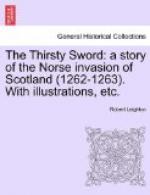“A few hundred peasant lads, your Majesty, and some eight hundred men of Bute,” said the knight.
“And are there then none cf your own men of Arran?”
“Alas, sire, these Norse dogs have left me but a handful of followers, for my uncle has been slain, and our four castles have been taken. Our islanders have taken refuge among the mountains. I and my family, who, by God’s grace, escaped, have been these two weeks past in Bute, where Earl Kenric has most heroically saved the lives of many hundreds of your loyal subjects. ’Tis true he has lost his castles of Rothesay and Kilmory, but —”
“Kenric of Bute has done well,” said the King. “We have already heard of all that he has done for the people of Bute. It was from one of his own messengers that we first heard of Hakon’s arrival on our coasts. Kenric shall not be forgotten. Our only regret is that he did not put an end to that villainous outlaw his uncle. But there may yet be hope that Roderic is in the field this day. So we pray you, Sir Piers, should you encounter him, deal him his death blow, and you shall have our eternal gratitude. And now to your work, and God defend the right.”
Then as Sir Piers rode off to rejoin his troops, the King turned to a stalwart warrior at his side and bade him show King Hakon a lesson in defence. This warrior was Alexander the high steward of Scotland, a man bred in the use of arms, and, next to Sir Piers de Currie, the most valiant soldier that fought in that field. And with him rode three good English knights who were of the court of Alexander. With a full company of cavalry he rode across the plain and took up his position with Sir Piers de Currie.
During this interval the hailstorm had abated, and the Norsemen had again effected a landing in great numbers under the chiefs Ogmund Kraekidantz and Haffling of Orkney.
Sir Piers de Currie and the steward rode forward side by side, attempting in the chivalrous style of the time to provoke an encounter. But none would take this challenge, so Sir Piers rode back. Then the steward, riding in front of the ranks of the enemy who were drawn up along the beach, was speedily surrounded. Spurring his charger, he dashed forward, and wielding his great battle-axe he struck down the opposing Norsemen as the waving wheat falls before the sickle, leaving a row of slain men in his track.
The Norsemen then rushed forward with loud cries to meet the troops of peasants and men of Bute who charged them. But the horsemen galloped in between and drove the enemy along the shore. The fair-haired warriors of the North again and again rallied and behaved with the accustomed bravery of their viking ancestors, fearless of wounds and glorying in warlike death.
Many galleys were then brought nearer inshore, and though assailed by heavy stones from the Scots’ machines and ceaseless showers of arrows, their men scrambled upon the beach. And now Sir Piers de Currie again rode forward, followed by Kenric, Allan Redmain, Duncan Graham, many men of Bute, and others of Lanark and Ayr. This was the one sortie of the engagement that was in the nature of a real battle. In numbers the two sides were almost equal.




